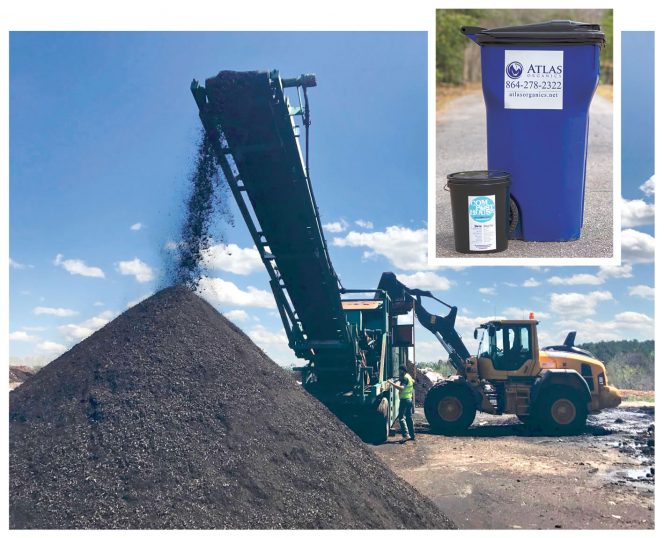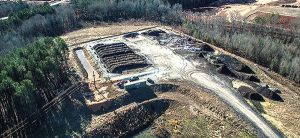South Carolina-based Atlas Organics got its start collecting organics, then via a public private partnership, opened a composting facility at a county landfill.
Marsha W. Johnston
BioCycle June 2018

Most of Atlas Organics’ STA-certified compost is sold in bulk to area farmers. Commercial food waste clients receive 35- and 64-gallon carts; residential and small business customers utilize 5- or 13-gallon buckets as part of Atlas’ Compost House collection program (inset).
Meanwhile, for his entrepreneurial scholarship program at Wofford College in Spartansburg, South Carolina, McMillin designed a recycling business to which he had to commit 20 hours per week. “Talking to some recycling customers, we realized food waste was a big part of their waste stream that wasn’t being addressed,” says McMillin. “So we started researching, but there weren’t any permitted [composting] facilities in South Carolina other than at the Charleston County landfill at Bees Ferry.” Clemson was the second.
Nihart spent his first year after college (2013) working at Vision Recycling, an organics recycling company in California, to learn more about commercial-scale composting. McMillin continued his collection business with one employee, “using Ford 250 pickup trucks and trailers” to swap out roll-off carts of organic waste for approximately 15 customers.
Joining Forces
In June 2014, South Carolina passed Regulation 61-107.4, which established minimum standards “for the proper management of yard trimmings, land-clearing debris and other organic material” and to encourage composting and establish standards for the production of compost. Nihart decided to return to South Carolina and start a business. Shortly after, a former Clemson roommate introduced him to McMillin. “We had heard about each other,” Nihart recounts, “as there are not a lot of people in the food waste game here. I didn’t know if he would be a competitor or future partner, but from there, we decided to work alongside each other.”
Adds McMillin: “In the beginning, the idea was `I’ll collect and bring it to you to process and we run two separate companies.’” Which is precisely what they did for 18 months, collecting food waste from commercial clients, such as Michelin North America, grocery stores and restaurants in upstate South Carolina. Without their own composting facility, collected organics were hauled to composters in North Carolina and Georgia, up to 120 miles away. Nihart and McMillin tried, unsuccessfully, to raise money to build a suitable composting facility and expand. “Whenever we tried to get capital, they told us that vertical integration [of our companies] was more powerful,” explains McMillin.
Despite a lack of funds to develop further, the entrepreneurs secured a contract with Greenville County Solid Waste to build and operate a composting site at its Twin Chimneys Landfill in Honea Path (SC). “We had a public-private partnership, but no money,” says Nihart. He and McMillin called on a syndicate of angel equity investors called VentureSouth, who also told them the two companies should be one vertically integrated company.
They decided to take that step, and merged the two companies into one, which they called Atlas Organics. Venture South provided Atlas $550,000 in seed funding at the end of 2015, in exchange for an undisclosed percentage of the company. “If we pay dividends, they will get a percentage,” explains Nihart. “They will exit either when Atlas can buy back shares or if the company is acquired.” Atlas Organics focuses exclusively on food waste collection and compost production.
The company engaged O2 Compost to help Atlas design and build a 12,000 tons/year composting facility for food waste and yard trimmings on an 8-acre parcel at the Twin Chimneys Landfill. To conserve space, it opted for a 4-zone, extended aerated static pile system. The facility’s 100-foot by 200-foot impermeable pad is constructed of engineered layers of clay and gravel rather than concrete.
“It is cheaper,” notes Nihart. “I would rather have concrete, but that could have been over $100,000, at the 16 inches depth that is necessary. But this works well.” Opening in May 2016, the Class 2 facility, as defined by the state, cannot accept raw meat or meat by-products or biosolids. The seed money also allowed Atlas to expand its commercial organics collection into the neighboring Columbia (SC) area, and to western North Carolina (Asheville and Hendersonville).
Residential Food Scraps
Concurrently, Atlas Organics established Compost House to provide households and small business in Spartanburg and Greenville with food waste collection. Atlas set up drop-off locations before it had the critical customer mass needed to start residential pick up services because it allowed the company to immediately be “a solution for organics diversion if they were willing to bring it to us,” explains Leslie Rodgers, Education Director & Compost House Coordinator. In Spartanburg, Compost House has drop-off locations at the farmers market and downtown community market. The drop-off site in Greenville is at Swamp Rabbit Café & Grocery.
To further get the word out about both drop-off and doorstep services, Rodgers relied on Atlas staff’s “personal contacts, farmers markets, homeowners associations and local food specialist retailers Hub City Coop (Spartanburg) and Swamp Rabbit. “Hub City Coop was our first partnership,” she explains. “If you are a member, you get a discount on a Compost House subscription.” In November 2017, Atlas expanded its residential Compost House service to Simpsonville.
The Compost House collection program in Greenville has grown over the last year to 180 residential doorstep, drop-off and small business customers. All customers, whether residential pick up or drop-off, receive a 5-gallon bucket; small businesses and offices get either 5- or 13-gallon buckets, which Atlas collects in a Ford van. Residential customers are provided Biobag certified compostable bucket liners. (Bags are not used for commercial or industrial customers.) All subscribers, including drop-off customers, are entitled to receive 10 gallons of finished compost per month. Rodgers says Atlas has only rare problems with contamination from its subscribers.
Meanwhile, the company’s commercial and industrial food waste collection continues to grow in six sectors — healthcare, grocery, industrial, education, hospitality, and corporate — in Upstate and Midlands, SC, Western North Carolina, and Eastern Tennessee. For commercial clients, it uses International 24-foot box trucks to pick up full and deliver clean 35- and 64-gallon roll-off carts. Two ProStar Day Cab with Wetline Kit semis collect food waste and industrial by-products at industrial sites in 30-cubic yard sludge boxes for wet wastes and 53-foot dry van trailers for waste in watertight containers or bins. All of the collected carts and bins are emptied and cleaned at Atlas’ warehouse, with the wastes consolidated into sludge boxes for transport to the Twin Chimneys Compost Facility.
Atlas accepts pre and postconsumer food waste and soiled paper. It is working with South Carolina regulators to modify its Class 2 permit to allow raw meat products. For commercial clients, the company trains employees about necessary source separation steps. “We go in and train, and if they have a lot of turnover for whatever reason, we will do a retraining,” says Nilhart. The company does a lot of work with Michelin North America’s headquarters, and four or five of their plants. “The majority is food waste collection from their cafeterias, but we can also take some of the by-product they get in the manufacturing process,” notes McMillin.

The aerated static pile composting facility, located on an 8-acre parcel at Greenville County Solid Waste’s Twin Chimneys Landfill, has capacity to process 12,000 tons/year of food waste and yard trimmings.
In 2017, Atlas processed about 4,000 tons each of food waste and yard trimmings, or approximately 8,000 tons. McMillin notes that as soon as Atlas opened the Greenville composting site, many municipalities contacted the firm about establishing similar operations at their facilities. Atlas has not built another site, but plans to double its active pad area at Twin Chimneys to be able to process 24,000 tons/year, once it completes a permit modification process with the county. “We’re not quite to capacity yet, but we’re looking to expand this summer,” says Nihart, adding that Atlas has “never” had any issues with the neighbors about odors at the composting site.
Atlas’ compost is STA-approved by the US Composting Council and is Certified South Carolina Grown. In 2017, it began hand bagging its product, Dirtbag, for sale to local nurseries. This program, still in the pilot phase, is being pushed out to 20 local retail sites. Most of the compost is sold in bulk to area farmers. “Over the past several months, Atlas has experienced a significant spike in inquiries and sales,” says Jim Davis, Atlas Vice President of Business Development. “A lot of that is coming from repeat customers sharing it with their network. It’s a very exciting thing for Atlas Organics to have farmers and home gardeners so pleased with the performance of our finished product.”
Marsha W. Johnston, an editor with Earth Steward Associates, is a Contributing Editor to BioCycle.










